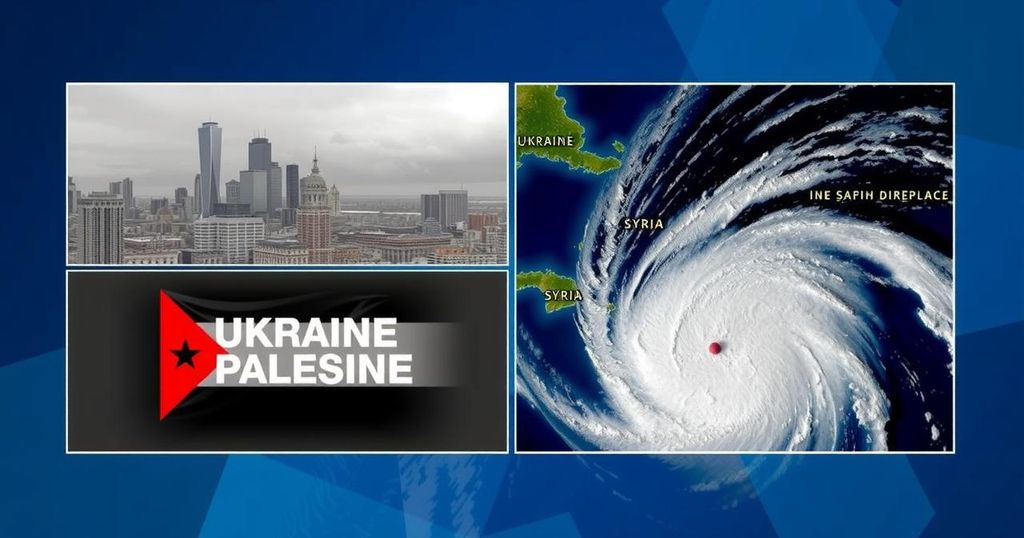The ongoing humanitarian crises in Ukraine, Gaza, Syria, and the aftermath of Tropical Cyclone Dikeledi necessitate urgent international attention and support. In Ukraine, humanitarian officials engage with local governments to streamline assistance for the displaced. Concerning Gaza, calls are made for unhindered aid delivery amid catastrophic conditions, while in Syria, critical health responses continue despite security challenges. In Africa, the impact of Tropical Cyclone Dikeledi is compounded by previous disasters, exacerbating conditions for many and heightening the need for humanitarian aid.
Fast Summary: The ongoing humanitarian crises in Ukraine, Gaza, Syria, and the aftermath of Tropical Cyclone Dikeledi necessitate urgent international attention and support. In Ukraine, humanitarian officials engage with local governments to streamline assistance for the displaced. Concerning Gaza, calls are made for unhindered aid delivery amid catastrophic conditions, while in Syria, critical health responses continue despite security challenges. In Africa, the impact of Tropical Cyclone Dikeledi is compounded by previous disasters, exacerbating conditions for many and heightening the need for humanitarian aid.
Article Body: The humanitarian landscape in Ukraine continues to alter dramatically as Tom Fletcher, the Under-Secretary-General for Humanitarian Affairs, engages with local communities affected by conflict. Fletcher visited Zaporizhzhia, observing the destruction of a medical facility and a newly built underground school designed for 1,000 children. His current itinerary includes a visit to front-line areas in Donetsk and a trip to Kharkiv, where he will jointly unveil humanitarian and refugee response plans with Filippo Grandi of UNHCR.
In the case of the Occupied Palestinian Territory, the humanitarian situation in Gaza remains dire. The UN Office for the Coordination of Humanitarian Affairs (OCHA) has urged Israeli authorities to facilitate aid delivery across the region. Reports indicate persistent obstructions of UN-led humanitarian efforts, leaving many civilians essentially trapped amidst ongoing hostilities. Recent evacuation orders have further complicated existing struggles, impacting critical infrastructure and endangering access to essential resources such as water and food.
Syria’s humanitarian response is likewise challenged by security conditions. The UN continues to operate amid volatile situations, notably in Aleppo, where hostilities have led to significant water supply disruptions. Oral cholera vaccination efforts in the Al Hol camp reflect ongoing public health initiatives despite logistical hurdles.
Meanwhile, Tropical Cyclone Dikeledi brings additional challenges in southeastern Africa, where its recent landfall has resulted in casualties and extensive displacement in Madagascar. Humanitarian organizations are mobilizing resources to assist affected populations, while the cyclone’s impact on northern Mozambique continues to provoke serious concerns for shelter and water access. UN agencies are actively seeking funding to address the needs of over 400,000 people impacted by these disasters.
Background: Currently, multiple crises demand global humanitarian responses, particularly highlighting the precarious situations in Ukraine and Gaza. The ongoing conflict in Ukraine has led to widespread displacement, necessitating urgent aid and refugee support. In Gaza, humanitarian organizations struggle to navigate restrictions that thwart essential aid delivery amidst militant hostilities. Syria faces ongoing challenges as the situation remains unstable, affecting the deployment of health services. The repercussions of climate events, such as Tropical Cyclone Dikeledi, further demonstrate the critical need for coordinated international assistance in less resourced regions.
Quotes:
“The need to protect places of refuge and to end the war” – Muhannad Hadi.
Proof to Links: The article does not provide specific links.
Conclusion: In summary, these pressing humanitarian crises across Ukraine, Gaza, Syria, and tropical cyclone-affected regions highlight the critical necessity for improved international cooperation and resource allocation. Immediate responses are required to safeguard the welfare of displaced populations and ensure the continuous provision of essential services in areas particularly devastated by conflict and natural disasters. The global community must unite to address these urgent needs to prevent further humanitarian deterioration.
The article outlines significant humanitarian issues currently affecting Ukraine, the Occupied Palestinian Territory, Syria, and regions impacted by the Tropical Cyclone Dikeledi. It reflects on active engagements by international humanitarian officials in response to local crises, the complexities faced in delivering immediate aid, and the concurrent challenges posed by recent natural disasters. Through these comprehensive reports, the article emphasizes the urgent need for international collaboration and the mobilization of resources to address the escalating humanitarian crises.
In conclusion, the ongoing humanitarian crises in Ukraine, Gaza, Syria, and areas impacted by Tropical Cyclone Dikeledi highlight an urgent call for global attention and action. The need for aid, protection of civilians, and blockages in aid delivery point to a pivotal moment for the international community to respond emphatically. Coordinated efforts are essential to ensure that vulnerable populations receive the necessary support in their times of need.
Original Source: www.unocha.org






